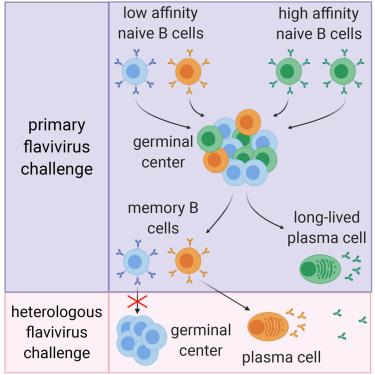Immunity ( IF 25.5 ) Pub Date : 2020-10-02 , DOI: 10.1016/j.immuni.2020.09.001 Rachel Wong 1 , Julia A Belk 2 , Jennifer Govero 3 , Jennifer L Uhrlaub 4 , Dakota Reinartz 4 , Haiyan Zhao 5 , John M Errico 5 , Lucas D'Souza 4 , Tyler J Ripperger 4 , Janko Nikolich-Zugich 4 , Mark J Shlomchik 6 , Ansuman T Satpathy 2 , Daved H Fremont 5 , Michael S Diamond 7 , Deepta Bhattacharya 4

|
Memory B cells (MBCs) can respond to heterologous antigens either by molding new specificities through secondary germinal centers (GCs) or by selecting preexisting clones without further affinity maturation. To distinguish these mechanisms in flavivirus infections and immunizations, we studied recall responses to envelope protein domain III (DIII). Conditional deletion of activation-induced cytidine deaminase (AID) between heterologous challenges of West Nile, Japanese encephalitis, Zika, and dengue viruses did not affect recall responses. DIII-specific MBCs were contained mostly within the plasma-cell-biased CD80+ subset, and few GCs arose following heterologous boosters, demonstrating that recall responses are confined by preexisting clonal diversity. Measurement of monoclonal antibody (mAb) binding affinity to DIII proteins, timed AID deletion, single-cell RNA sequencing, and lineage tracing experiments point to selection of relatively low-affinity MBCs as a mechanism to promote diversity. Engineering immunogens to avoid this MBC diversity may facilitate flavivirus-type-specific vaccines with minimized potential for infection enhancement.
中文翻译:

亲和力受限的记忆 B 细胞主导对异源黄病毒的回忆反应
记忆 B 细胞 (MBC) 可以通过次级生发中心 (GC) 塑造新的特异性或通过选择预先存在的克隆而无需进一步亲和力成熟,从而对异源抗原做出反应。为了区分黄病毒感染和免疫接种中的这些机制,我们研究了对包膜蛋白域 III (DIII) 的回忆反应。在西尼罗河、日本脑炎、寨卡病毒和登革热病毒的异源攻击之间有条件地删除激活诱导的胞苷脱氨酶 (AID) 不影响回忆反应。DIII 特异性 MBC 主要包含在偏向浆细胞的 CD80 +子集,并且很少有 GC 在异源助推器之后出现,这表明回忆反应受到先前存在的克隆多样性的限制。单克隆抗体 (mAb) 与 DIII 蛋白结合亲和力的测量、定时 AID 删除、单细胞 RNA 测序和谱系追踪实验表明,选择亲和力相对较低的 MBC 作为促进多样性的机制。避免这种 MBC 多样性的工程免疫原可能会促进黄病毒类型特异性疫苗的产生,从而最大限度地降低感染增强的可能性。











































 京公网安备 11010802027423号
京公网安备 11010802027423号